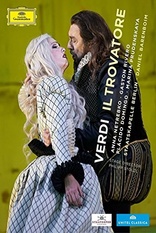
Title: Giuseppe Verdi's "Il Trovatore"
Original title: Giuseppe Verdi: Il trovatore
Released: 2013
Genre: Opera
Directed by: Philipp Stölzl, Tiziano Mancini
Conductor: Daniel Barenboim
Starring: Anna Netrebko (soprano), Marina Prudenskaya (mezzo-soprano), Plácido Domingo (tenor), Gaston Rivero (tenor), Anna Lapkovskaja (mezzo-soprano), Florian Hoffmann (tenor), Wolfgang Biebuyck (bass), Adrian Sâmpetrean (bass), Staatskapelle Berlin, Chor der Staatsoper Berlin
Description:
Lovers of Il trovatore a work famous for its perennially popular cavatinas and cabalettas rightly expect the singers to be at the very top of their vocal game and particularly look forward to the top C at the end of Manrico s stretta, a true do di petto produced not from the head but from the chest. Yet the production of the work that was staged at the end of 2013 by the Staatsoper Unter den Linden in Berlin jointly run by Daniel Barenboim and Jürgen Flimm deliberately flouted these expectations and traded familiarity for astonishment. Such a reaction was due not only to the two most famous singers of our age, both of whom were appearing onstage for the first time in their respective roles, but also to the company s music director, who made it abundantly clear that he was concerned with more than just a feast for the ears and rousing rum-ti-tum rhythms. Rather, Barenboim adopted a more daring, not to say unprecedented, approach to Verdi s score, seeking greater refinement and bringing out darker colours than we are used to hearing. Leonora s entrance aria, Tacea la notte placida, for example, was taken so slowly that one would have been afraid that the singer might run out of breath if the soprano in question had not been Anna Netrebko. The Russian star has such superb breath control that you would think the Staatskapelle were supporting her all the way. The quietest of phrases blossom into life, rising to a glowing top note that then returns to its original volume by means of a particularly bold use of messa di voce, most notably in Leonora s great aria in Part 4, D amor sull ali rosee, where we find the magic of a late bel canto style to which Verdi brought such authentic emotional depth that it is impossible to mock his ideal of beauty as no more than a vocal tightrope act. Rather we can respond to an art that speaks directly to our soul
Issued: Germany | Decca
Duration: 2:25:07
 淘宝店铺:http://94hd.taobao.com
淘宝店铺:http://94hd.taobao.com